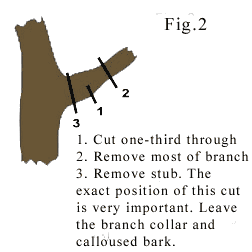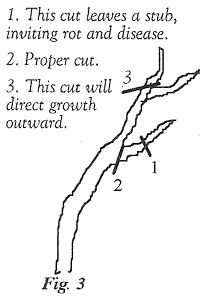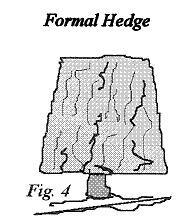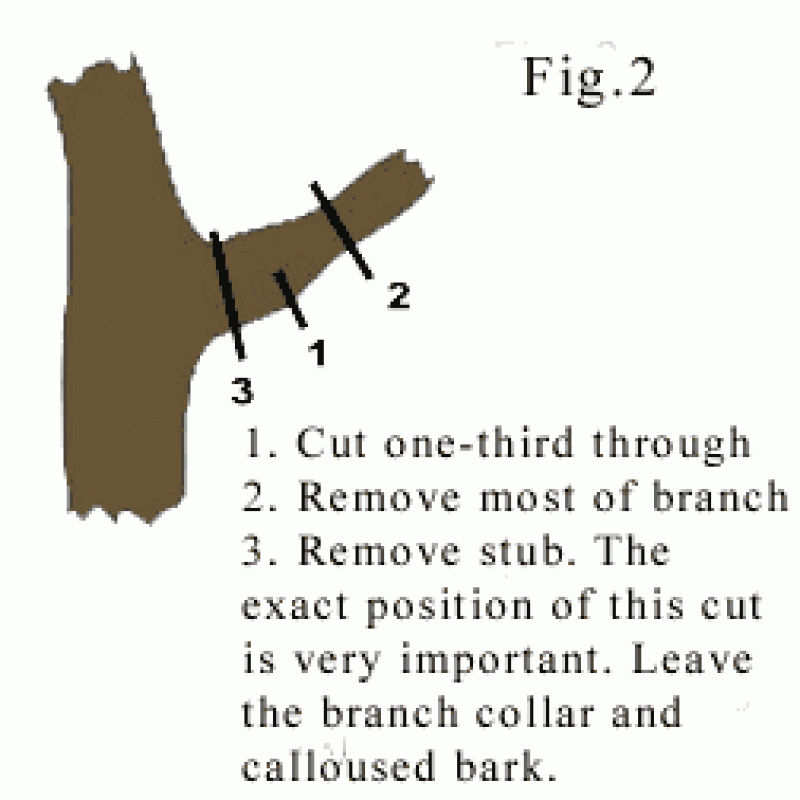Dormant Pruning - Part 2
by Dan Eskelson on Apr 30, 2012
Please also visit, Part 1 - The Art and Science of Pruning
Visualization is an extremely important skill that will help in your pruning efforts. For this reason, I've created some simple line drawings and uploaded them within this article
Pruning cuts must be made with full knowledge of future consequences, relying on our perception, or visualization, of the plant's growth characteristics, intended use, age, and desired form. Various plant forms are "created," early in the plant's life, by choosing new growth which will eventually produce the desired shape. The growth that does not conform to our visualization is removed.
For example, the vase, or open center, tree relies on a short, strong vertical trunk to support several main leaders, which in turn supports numerous "laterals." Choose leaders which emerge from the trunk at approximately a 10 o'clock or 2 o'clock angle; these will provide the strength necessary to hold future growth, snow and ice loads and the crop. Leaders must be spaced evenly around the trunk.
 As leaders enlarge over the years, choose the laterals which directly hold foliage, flowers and/or fruit. By visualizing the mature form and understanding growth habits, proper spacing of laterals is achieved. For instance, an apple needs room to mature with plenty of light and air, but this vigorously growing tree continually sends out excess growth which will stunt the development of fruit (as well as limiting total plant health).
As leaders enlarge over the years, choose the laterals which directly hold foliage, flowers and/or fruit. By visualizing the mature form and understanding growth habits, proper spacing of laterals is achieved. For instance, an apple needs room to mature with plenty of light and air, but this vigorously growing tree continually sends out excess growth which will stunt the development of fruit (as well as limiting total plant health).
With regular pruning, saw cuts are seldom necessary - but if they are, *take great caution*. In Fig. 2 notice that the final cut is slightly outside the trunk line and angled down and outward. This ensures that the trunk's sap flow will produce the healing tissue which will eventually seal the cut. Many trees have been lost or seriously deformed by the improper saw cuts. Don *not* use tree paint or any other sealer on pruning cuts. If you are not sure of your technique, call a professional.
The most common error of amateur pruners is leaving "stubs." When heading back, always cut just above a bud - or just above lateral growth. When thinning entire branches, cut back to the source growth. See Fig. 3. Stubs invite rot - *Do not leave stubs!*
Vigorously growing plants produce "suckers," rapidly growing, usually vertical, shoots. Cut these yearly, or they will restrict air and light from the middle of the plant and eventually become dominant over properly positioned growth. One exception to this rule is when reworking older trees or shrubs, a well placed sucker may be chosen to replace a branch too horizontal or otherwise inferior. After one season's growth, cut this sucker back to an outside bud, removing 1/3 to 1/2 of its length.
Care must be taken when pruning old, overgrown trees. A thorough job completed in one season will seriously weaken, or possibly even kill the tree - spread this renovation pruning over three years to limit shock to the tree.
 When pruning hedge plants, be sure to angle the sides slightly outward from top to bottom; otherwise, lower portions of the plant will not receive enough light, will become thin, and eventually leave bare areas - see Fig. 4.
When pruning hedge plants, be sure to angle the sides slightly outward from top to bottom; otherwise, lower portions of the plant will not receive enough light, will become thin, and eventually leave bare areas - see Fig. 4.
To summarize briefly - remember to visualize the ideal form of the plant and make each cut contribute to that form. Remove diseased, dead or damaged wood and remove branches which cross (or those which you see *will* cross or otherwise conflict). In general, favor growth which grows outward overgrowth which grows back toward the middle of the plant.
*Always* use a sharp pruning, and *never* leave stubs. This basic discussion of the art and science of pruning will get you off to a good start, but before going out to prune the whole yard, gather additional information from a good book and/or lessons from an experienced pruner.
Popular Articles
Three Places to Spend Money on the Exterior of Your Home
When you have the exterior of your home remodeled, you are investing, time, energy and convenience into the project and you want to make sure that...
95397 Views
Homemade Headboards-Make an Upholstered or Wooden Headboard
Homemade headboards can add a lot of personality to any bedroom. They can be coordinated with existing furniture and room decor or they can be the...
74405 Views
When to Use a Brush, Roller or Sponge Brush
Brushes are a good choice for painting trim and woodwork. They are also useful for cutting in the edges around the top and bottom edges and corners...
71787 Views
Creating a Cottage Kitchen with Bead Board
Kitchen decor can range from modern and bold to elegant and elaborate by using strategic kitchen pieces. One of the most popular decorating trends...
52843 Views
Gas Fireplace Diagnostics and Troubleshooting
Follow these steps for diagnosing and troubleshooting Gas Fireplaces repairs. For the average DIYer, this may seem intimidating, depending on the...
30613 Views
Latest Articles
How Much Does It Cost To Take A Bath?
Plumbers know that a bath may seem like a relaxing luxury, but the real cost extends far beyond your water bill. The average soak uses 35 to 50...
on Apr 8, 2025
10 Concrete Patio Ideas on a Budget
A concrete patio can be a game-changer for your outdoor space. It is durable, versatile, and can be customized to fit your style. But what if you...
on Mar 25, 2025
Tips for Creating a Stunning Personalized Photo on Canvas
Order the unique beauty of a personalized photo on canvas and bring your memories to life. With a customized photo on canvas, you can transform...
on Mar 7, 2025
Best Areas to Buy Property in Singapore for Long-Term Growth
Singapore's real estate market remains one of the most stable and lucrative in the world. With limited land supply, strong governmental...
on Feb 18, 2025
Troubleshooting Excess Water in Your HVAC Secondary Condensate Drain Pan
When maintaining your air conditioning system, it is easy to overlook the condensate drain pan - until excess water starts pooling in places where...
on Jan 12, 2025
Featured Articles
What Type of Licensed Contractor Should You Hire?
on Feb 28, 2017
Hire Contractors / Estimates

Looking for a specialty project? There are many types of contractors available for your home improvement needs. Finding the right type of...
Sponsored Articles
Best Areas to Buy Property in Singapore for Long-Term Growth
on Feb 18, 2025
Real Estate / Finance

Singapore's real estate market remains one of the most stable and lucrative in the world. With limited land supply, strong governmental...
Actions
Top Categories
- Garden / Landscaping / Patio — 264
- Kitchen / Bathrooms — 240
- Real Estate / Finance — 203
- Appliance / Repair — 186
- Interior Design / Decor — 184
- HVAC / Air Conditioning — 148
- Cleaning / Maintenance — 144
- Improvements / Remodeling — 131
- Plumbing / Basements — 118
- Floors / Tile / Hardwood — 116
- Doors / Garages — 113
- Safety / Security — 113
Articles Archive
More DIY Articles
Teak Patio Furniture Buying Tips
Whenever the weather conditions are conducive, the patio is where you will find it more appropriate to spend most of your free time. It should be...
Smart Upgrades to Get More from Your Home Renovation
If you are planning a home remodeling project, it is the perfect time to consider making a few major upgrades that will make your home more...
How to Prolong the Life of Your Roof
One thing is for sure; the average homeowner probably does not spend too much time thinking about their roof on a day-to-day basis. In fact, I am...
Things to Consider while Hiring a Maid
Hiring a maid has become an essential need of almost every second individual because of the competitive world they are living in where they want to...
How to Feminise a Masculine Room
If you are moving in with your man, or you have bought the remnants of a bachelor pad, the first you are going to need to do is add a feminine...

